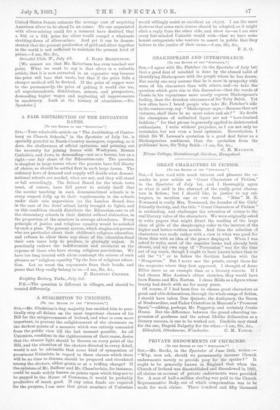A FAIR DISTRIBUTION OF THE EDUCATION RATES.
[To THE EDITOR OF THE " SPEOTATOIL."3 SIR,—Your admirable article on " The Archbishop of Canter- bury on Church Schools," in the Spectator of July 1st, is specially grateful to North. Country managers, exposing, as it does, the shallowness of official optimism, and pointing out the necessity for joining forces with Wesleyans, Roman Catholics, and Jews, in demanding—not as a favour, but as a right—our fair share of the Education-rate. The question is simplest in large towns where the parents have full liberty of choice, so should be settled first in such large towns. The ordinary laws of demand and supply will decide what denomi- national schools are needed, what are not, and they will stand or fall accordingly. The School Board for the whole town must, of course, have full power to satisfy itself that the secular teaching in such denominational schools is in every respect fully up to their requirements in the schools under their sole supervision (as the London Board does in the case of the Jews' school, lately brought to light), and on. this condition should distribute the Education-rate to all the elementary schools in their district without distinction, in the proportion of the numbers in average attendance. Every principle of justice and religious equality would be satisfied by such a plan. The present system, which singles out parents who are particular about their children's religious education, and refuses to allow them any share of the education-fund their own rates help to produce, is glaringly unjust. It practically endows the indifferentist and secularist at the expense of those who have strong religious eonvictions. We have too long treated with silent contempt the misuse of such phrases as "religious equality "by the foes of religious educa- tion. Let us wrest the arguments from their hands, and prove that they really belong to us.—I am, Sir, &c., P.S.—The question is different in villages, and should be treated differently.


































 Previous page
Previous page